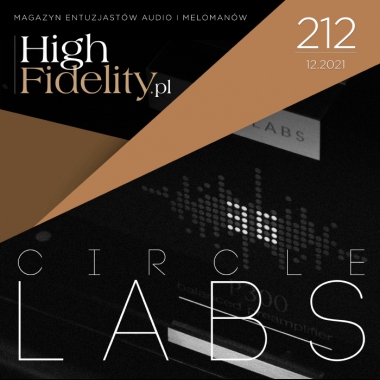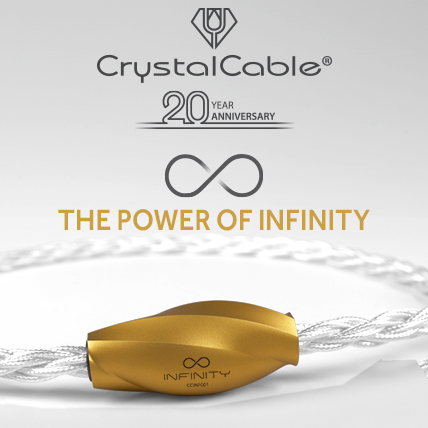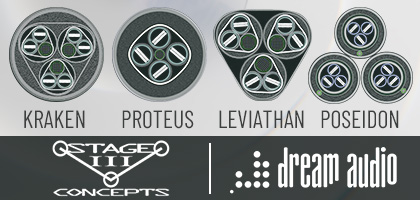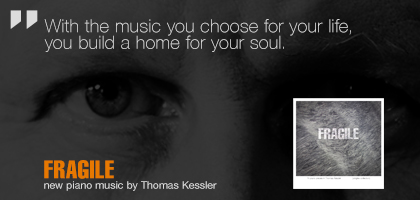No. 261 February 2026
- COVER REVIEW: TECHDAS Air Force IV ⸜ turntable » JAPAN
- RECORDING TECHNIQUE ⸜ music: 3M DIGITAL AUDIO MASTERING SYSTEM Part 2 || MUSIC » USA
- MUSIC ⸜ review: ARNE DOMNÉRUS, , Jazz At The Pawnshop, Proprius/AudioNautes Recordings MQA-CD Crystal Disc ⸜ 1977/2025 » SWEDEN / ITALY
- REVIEW: CIRCLE LABS AS100 ⸜ integrated amplifier » POLAND
- REVIEW: SHANLING EC Zero T ⸜ MQA-CD player • mobile » CHINA
- REVIEW: FEZZ AUDIO Sagita Prestige Evo & Olympia Evo Mono ⸜ linestage & power amplifier • monaural » POLAND
- MICRO REVIEW: ACOUSTIC REVIVE PS-DBLP ⸜ record clamp / stabilizer » JAPAN

|
Editorial
Text: WOJCIECH PACUŁA |
 |
No 212 January 1, 2022 |
|
An interesting case of piano, by FAZIOLI

⸜ The material recorded during the Chopin Competition, in accordance with the tradition and terms agreed with sponsors, has already been released by the Deutsche Grammophon label: Bruce Liu, Chopin - Winner Of The International Fryderyk Chopin Piano Competition 2021 (486 1555); unfortunately, it features one of the ugliest DG covers of recent years. Please pay attention to the time of the entry - as you probably remember, the jury could not make a decision for a long time, so we waited for it until then, even though the information about the winners was supposed to be available at midnight. From the later statements of the jury members, we learned that while the first place of BRUCE LIU was undisputed, the subsequent ones required longer reflection and discussion. Right after the verdict was announced, the winner said:
As we read on the official website of the organizer, Bruce (Xiaoyu) Liu was born on May 8, 1997 in Paris, he graduated from the Music Conservatory in Montreal in the class of Richard Raymond, and currently continues his studies with Dang Thai Son. He collaborated with such ensembles as the Cleveland and Montreal symphony orchestras, the Israeli Philharmonic Orchestra, Orchestra of the Americas, Camerata Jerusalem, and has given a series of concerts with the China NCPA Orchestra. [...] He is a laureate of many international piano competitions, incl. ones in Sendai, Montreal, Viseu and Tel Aviv (source: CHOPIN2020.pl; accessed: November 29, 2021). 
⸜ Fazioli piano, model F 228 – the same as used by the participants of the Chopin Competition The success of the Canadian pianist of Chinese origin is undisputed and most of us, who followed - even at random - the progress of the competition, knew that this musician would succeed. Apart from the mainstream deliberations and discussions on the piano technique, approach to the material, interpretation and even the clothing of the Competition participants, there was also an equally interesting, and perhaps even more important, discussion about the instruments played by the participants of the Chopin Competition this year. It is so, that musicians can choose an instrument they want to present their skills with, provided that it is one of the few provided by the organizer. They only have 15 minutes to test the instruments and make their decisions. Although the piano industry in Poland has a long tradition, before the war, in the former Congress Kingdom, there were 20 factories producing about 6,000 instruments a year, the Polish piano never took part in the Warsaw competition. Its first editions were dominated by pianos from Bechstein, Bösendorfer, Pleyel and Steinway. As we read in the material prepared by the RMF Classic portal on the basis of PAP materials, the fewest instruments - only three - were available to pianists in 1965 and all three were delivered by Steinway & Sons. And next:
Nowadays, participants can choose from Steinway, Kawai and Yamaha pianos, and the undisputed "winner" of these choices was the first, German company. It is obviously related to the slow disappearance of the art of piano production. If my information is correct, we currently have only nine producers of this type of instruments in Europe, although in the first half of the 20th century there were still about 300 of them. It is indicated that China dominates in this field - in 2012 year (I do not know any newer statistics), out of 500,000 units produced in the world, as many as 400,000 were made in the Middle Kingdom, in the Pearl River factory, which is the world's largest piano manufacturer. 
⸜ Fazioli F 308 – the largest mass-produced concert grand piano in the world największy, produkowany seryjnie, fortepian koncertowy świata In 2010, however, a new company joined the elite group of instruments offered to pianists during the Warsaw competition, which - unlike other brands - does not belong to large producers, or to a large concern, the Italian family company FAZIOLI. Its director, PAOLO FAZIOLI, was born in Rome in 1944 in a family with furniture-making traditions. It's a tiny manufacturer with just 50 employees, with one factory in the sleepy town of Ronche, about 60 km from Venice; During the interview that Mr. Paolo gave TVP Kultura while we were waiting for the jury's verdict, he mentioned that he would soon open a second one. Until recently, this company was able to produce 110-120 pianos per year, and the production of one instrument requires about 1000 hours of work. Compare that to the 400,000 pieces from Pearl River… |
▌ CLASSICS THIS BRAND WAS INTRODUCED IN POLAND in 2010, in two places at the same time. As reported by Dziennik Łódzki on October 19, 2010, the day before, "the Academy of Music showed a piano from the Italian Fazioli manufacture". And than: “This is a new acquisition of AM, which was presented during a short concert. Paolo Fazioli himself, a pianist, constructor and owner of the manufacture, sat at the keyboard for a moment. As Antoni Wierzbiński, the chancellor of the Academy of Music said on this occasion, the winners of Chopin competitions choose this piano "for the sound of the Italian sun that can be heard in it" (ANNA PAWŁOWSKA, Fortepian Fazioli za 480 tys. zł w Akademii Muzycznej, DZIENNIKLODZKI.pl; accessed: 29.11.2021). This information is important because four days later the 16th edition of the Chopin Competition ended, during which the Italian instrument was used for the first time. Interestingly, Fazioli, the F 228, was chosen by two later winners: DANIIŁ TRIFONOW - 3rd prize winner - and FRANÇOIS DUMONT - 5th prize winner. The breakthrough, however, was the recently completed competition, because three pianists who played on it entered the final stage: the already mentioned Bruce Liu, LEONORA ARMELLINI (5th prize winner) and MARTÍN GARCÍA GARCÍA (3rd prize winner and prize for the best concerto performance). 
⸜ Fazioli, F 308, a special Marco Polo version Compared to other piano manufacturers, Fazioli is just a start-up. Fazioli Pianoforti s.r.l. (now Fazioli Pianoforti S.p.A.) was founded in 1981, although the first design work began already in 1978. The first prototype model F 183, 183 cm long, was built in June 1980. In the same year, prototypes of other models were introduced, including the grand piano that is played during the Warsaw competition, the F 228 (228 cm long). The soundboards and boxes in Italian instruments are made of red spruce, from which the Stradivarius made its violin. “Each instrument is constructed with great care. Each of them has its own individual character, Italian character, ”says Paolo Fazioli. “It is an instrument that no musician should be afraid to play. Treated friendly, not brutally, it offers all the friendship back to the person who plays it. It can help a pianist a lot in the performance of various pieces." In 1986, the F 308 Concert Grand was launched, the longest concert grand on the market at over $ 150,000. As a matter of curiosity, let's say that the largest piano in the world, but made in a single copy, measuring 2.495 by 6.07 m, was made in Poland. Its designer was Daniel Czapiewski. The F 308 is a "serial" piano, and the purpose of its creation was, as we read in the company materials, to obtain an instrument with a greater sound power, intended for playing in large concert halls. The prototype was shown in April 1987 at the Teatro Comunale di Monfalcone. ▌ JAZZ THE FAZIOLI INSTRUMENTS WERE CONSTRUCTED WITH THE PLAYERS OF THE PHILHARMONIC AND CLASSICAL MUSIC in mind. The name did not get through to a wider audience from outside this circle immediately, but their unique timbre was also noticed by jazz musicians. I first came across the sound of the F 228 when I reviewed the Vattensaga by the Italian jazz band TINGVALL TRIO (SKP 9087-2, 2009) in 2009. This album was recorded in the famous Italian studio ArteSuono, known for regularly lending its hospitable interiors to many artists from the ECM label. This piano is part of the studio's equipment. 
⸜ Tingvall Trio’s Vattensaga released by Skip Records, with artist using the F 228 As I wrote then, the recording had "excellent space, emphasized by saturated, but not lumpy colors" and that the brilliantly led treble attracted attention. The summary was clear: "This is state-of-the-art example of the CD technology [...]", and the disc was rated "Reference". I am convinced that much of my delight came from how the piano sounded like. The most famous album on which the Italian instrument appeared so far is the Idiot Prayer: Nick Cave Alone at Alexandra Palace by NICK CAVE, released in July 2020, which is the soundtrack of the film with the same title (Bad Seed Ltd. BS019CD). The musician with the piano was shown on a fantastic cover, which perfectly reflects the pandemic nature of this recording, especially the loneliness of the performer on a huge stage. The musician was delighted with the sound of the instrument and after finishing the film, he contacted the Italian producer, offering to become their "ambassador" in exchange for a free instrument. Fazioli refused this request. 
⸜ The most famous album with the Fazioli F 228: Idiot Prayer by Nick Cave This is because we are dealing with a tiny, boutique company that resembles high-end audio manufacturers. They assume that if you want to use their "instruments" you have to pay - they are too small for these types of gifts. But even without such promotion, the company is developing wonderfully and has its "followers". In addition to the Chopin Competition, its instruments can be seen at the International Chopin Pyotr Tchaikovsky Competition in Moscow and Rubinstein Piano Master Competition in Tel Aviv, during which many finalists choose the Fazioli brand. What's more, the prestigious music school The Juilliard School in New York has had its own instrument of this type since 2015. Jazz music is equally strongly represented in this group. HERBIE HANCOCK has a concert contract stating that he only plays on Fazioli. He said for the CBS Sunday Morning: "I have a contract that I will only play the Fazioli piano ... It just seems so elegant - it feels like a very rich sound - and is just begging me to play on it. " As many as two models, F 278 and F 308, can be heard during the Umbra Jazz festival, during which no other brands are used. The F 308 is quite rare, because it is expensive, large, and requires a different playing technique. An example of an album on which it was featured would be Big, Bigger, Boogie by Stefan Ulbricht and Moritz Schlömer (SAM Media - fyn 0716-2, 2009). ▌ TO SUM UP FAZIOLI PIANOS ARE AN EXAMPLE of the fact that even in a corporate-centrist world, a career of an independent small producer is possible. However, it requires incredible passion, determination, talent, the right people and a bit of luck. Exactly the same qualities are necessary to prepare a top audio product, so it seems that they are universal in the world of music. The website of this Italian manufacturer offers some insight into the rules they follow:
There is nothing left to add to that, it’s a pure essence of the high-end. Welcome to the world of Fazioli! ■ WOJCIECH PACUŁA |
About Us |
We cooperate |
Patrons |
|
Our reviewers regularly contribute to “Enjoy the Music.com”, “Positive-Feedback.com”, “HiFiStatement.net” and “Hi-Fi Choice & Home Cinema. Edycja Polska” . "High Fidelity" is a monthly magazine dedicated to high quality sound. It has been published since May 1st, 2004. Up until October 2008, the magazine was called "High Fidelity OnLine", but since November 2008 it has been registered under the new title. "High Fidelity" is an online magazine, i.e. it is only published on the web. For the last few years it has been published both in Polish and in English. Thanks to our English section, the magazine has now a worldwide reach - statistics show that we have readers from almost every country in the world. Once a year, we prepare a printed edition of one of reviews published online. This unique, limited collector's edition is given to the visitors of the Audio Show in Warsaw, Poland, held in November of each year. For years, "High Fidelity" has been cooperating with other audio magazines, including “Enjoy the Music.com” and “Positive-Feedback.com” in the U.S. and “HiFiStatement.net” in Germany. Our reviews have also been published by “6moons.com”. You can contact any of our contributors by clicking his email address on our CONTACT page. |
 



|
   |







 EADS OF THE THURSDAY INTERNET ISSUES of most internet portals from October 21, 2021 informed on the home pages about the results of the just finished Chopin Competition:
EADS OF THE THURSDAY INTERNET ISSUES of most internet portals from October 21, 2021 informed on the home pages about the results of the just finished Chopin Competition: Bruce (Xiaoyu) Liu is the winner of the Chopin Competition!
Bruce (Xiaoyu) Liu from Canada took first place in the 18th International Fryderyk Chopin Piano Competition, the director of the Fryderyk Chopin Institute, Artur Szklener, announced at night. The verdict was announced a few minutes after two a.m. Szklener emphasized that the deliberation was extremely long, because it was not an easy decision to make.
Bruce (Xiaoyu) Liu is the winner of the Chopin Competition!
Bruce (Xiaoyu) Liu from Canada took first place in the 18th International Fryderyk Chopin Piano Competition, the director of the Fryderyk Chopin Institute, Artur Szklener, announced at night. The verdict was announced a few minutes after two a.m. Szklener emphasized that the deliberation was extremely long, because it was not an easy decision to make.


